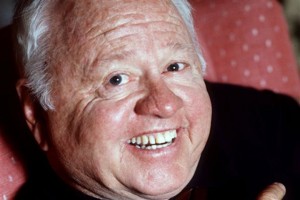

By Anthony McCartney
Associated Press
LOS ANGELES — Mickey Rooney’s approach to life was simple: “Let’s put on a show!” He spent nine decades doing it, on the big screen, on television, on stage and in his extravagant personal life.
A superstar in his youth, Rooney was Hollywood’s top box-office draw in the late 1930s to early 1940s.
He epitomized the “show” part of show business, even if the business end sometimes failed him amid money troubles and a seesaw of career tailspins and revivals.
Pint-sized, precocious, impish, irrepressible — perhaps hardy is the most-suitable adjective for Rooney, a perennial comeback artist whose early blockbuster success as the vexing but wholesome Andy Hardy and as Judy Garland’s musical comrade in arms was bookended 70 years later with roles in “Night at the Museum” and “The Muppets.”
Rooney died Sunday at age 93 surrounded by family at his North Hollywood home, police said.
The Los Angeles County coroner’s office said Rooney died a natural death.
Rooney was shooting a movie at the time of his death, “The Strange Case of Dr. Jekyll and Mr. Hyde.”
Over a four-decade span, he was nominated for four Academy Awards ,and received two special Oscars for film achievements, won an Emmy for his TV movie “Bill” and had a Tony nomination for his Broadway smash “Sugar Babies.”
A small man physically, Rooney sang and danced, played roles both serious and silly, wrote memoirs, a novel, movie scripts and plays, and married eight times, siring 11 children.
His first marriage — to the glamorous, and taller, Ava Gardner — lasted only a year. But Rooney fondly recalled years later — “I’m 5 feet 3, but I was 6 feet 4 when I married Ava.” Rooney’s final marriage in 1978 to singer Janice Darlene Chamberlain lasted longer than the first seven combined.
Rooney began as a toddler in his parents’ vaudeville act in the 1920s. He was barely 6 when he first appeared on screen, playing a midget in the 1926 silent comedy short “Not to Be Trusted.”
Rooney was among the last survivors of the studio era, which his career predated, most notably with the lead in a series of “Mickey McGuire” kid comedy shorts from the late 1920s to early ‘30s.
After signing with MGM in 1934, Rooney landed his first big role playing Clark Gable’s character as a boy in “Manhattan Melodrama.” Rooney soon was earning $300 a week with featured roles in films.
Then came Andy Hardy in the 1937 comedy “A Family Affair,” a role he would reprise in 15 more feature films over the next two decades.
Rooney’s peppy, all-American charm was never better matched than when he appeared opposite Garland in such films as “Babes on Broadway,” and “Strike up the Band.”
One of them, 1939’s “Babes in Arms,” earned Rooney a best actor Oscar nomination. He earned another one for 1943’s “The Human Comedy.”
Rooney also starred opposite Elizabeth Taylor in 1944’s horse-racing hit “National Velvet,” but by then, Rooney was becoming a cautionary tale for early fame. He earned a reputation for drunken escapades and quickie romances and was unlucky in both money and love.
After his failed marriage to Gardner in 1942, Rooney joined the Army, spending most of his World War II service entertaining troops.
When he returned to Hollywood, his savings had been stolen by a manager and his career was in a nose dive.
“I began to realize how few friends everyone has,” he wrote in one of autobiographies.
His movie career never regained its prewar eminence. “The Bold and the Brave,” 1956 World War II drama, brought him an Oscar nomination as best supporting actor. But mostly, he played second leads.
But no one ever could count Rooney out. He earned a fourth Oscar nomination, as supporting actor, for 1979’s “Black Stallion,” the same year he starred with Ann Miller in the Broadway revue “Sugar Babies.”
Joe Yule Jr., born in 1920, was the star of his parents’ act by the age of 2, singing “Sweet Rosie O’Grady” in a tiny tuxedo. His father was a baggy-pants comic, Joe Yule, his mother a dancer, Nell Carter.
His Mickey McGuire short comedies gave him a new stage name, later appended, at his mother’s suggestion, to the last name Rooney, after vaudeville dancer Pat Rooney.
After a lifetime of carrying on, he became a devoted Christian and member of the Church of Religious Science. He settled in suburban Thousand Oaks, about 40 miles west of Los Angeles.





